Intro
Unlock the secrets of your health with a CBC blood panel test, analyzing complete blood count, hematocrit, hemoglobin, and platelet levels to diagnose anemia, infection, and inflammation, providing valuable insights into your overall well-being.
The complete blood count (CBC) blood panel test is a fundamental diagnostic tool used by healthcare professionals to assess a patient's overall health and detect potential disorders. It is a simple, yet informative test that measures various components of the blood, providing valuable insights into the body's physiological and pathological processes. In this article, we will delve into the world of CBC blood panel tests, exploring their importance, components, working mechanisms, and practical applications.
A CBC blood panel test is a crucial preliminary test that helps healthcare professionals diagnose and monitor various medical conditions, such as anemia, infection, inflammation, and blood clotting disorders. By analyzing the different components of the blood, healthcare providers can identify abnormalities and gain a better understanding of the underlying causes of a patient's symptoms. The test is often used as a screening tool, allowing healthcare professionals to detect potential health issues before they become severe.
The CBC blood panel test is a versatile diagnostic tool that can be used in various medical settings, from routine check-ups to emergency situations. Its applications are diverse, ranging from monitoring chronic conditions to detecting acute infections. The test's ability to provide a comprehensive overview of a patient's blood profile makes it an essential component of modern medicine. In the following sections, we will explore the components, working mechanisms, and practical applications of the CBC blood panel test in greater detail.
Introduction to CBC Blood Panel Test
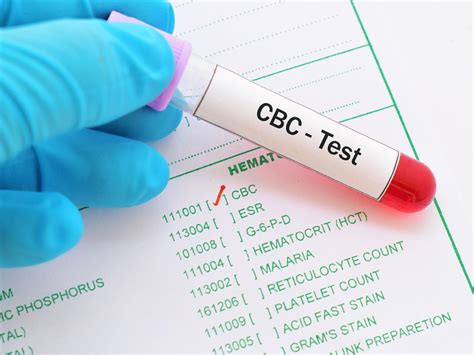
The CBC blood panel test is a laboratory test that measures various components of the blood, including red blood cells, white blood cells, platelets, and hemoglobin. The test is typically performed using an automated analyzer, which provides accurate and reliable results. The components of the CBC blood panel test include:
- Red blood cell count (RBC)
- White blood cell count (WBC)
- Platelet count (PLT)
- Hemoglobin (HGB)
- Hematocrit (HCT)
- Mean corpuscular volume (MCV)
- Mean corpuscular hemoglobin (MCH)
- Mean corpuscular hemoglobin concentration (MCHC)
Each of these components provides valuable information about the blood's physiological and pathological processes, allowing healthcare professionals to diagnose and monitor various medical conditions.
Components of CBC Blood Panel Test
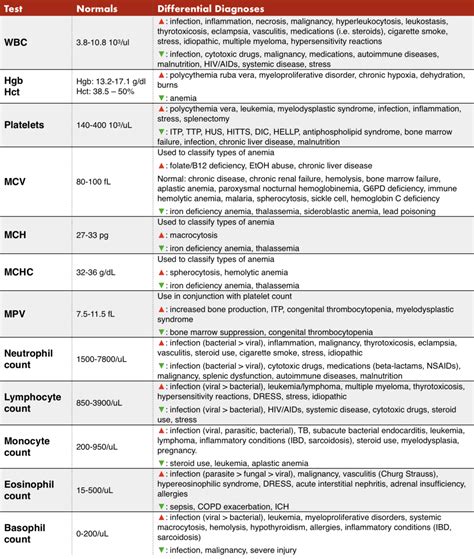
The components of the CBC blood panel test are crucial in understanding the blood's physiological and pathological processes. The red blood cell count (RBC) measures the number of red blood cells in the blood, which is essential for carrying oxygen to the body's tissues. The white blood cell count (WBC) measures the number of white blood cells, which play a vital role in the immune system. The platelet count (PLT) measures the number of platelets, which are essential for blood clotting.
The hemoglobin (HGB) level measures the amount of hemoglobin in the blood, which is a protein that carries oxygen to the body's tissues. The hematocrit (HCT) level measures the proportion of red blood cells in the blood, which is essential for maintaining blood viscosity. The mean corpuscular volume (MCV) measures the average size of red blood cells, while the mean corpuscular hemoglobin (MCH) measures the average amount of hemoglobin in red blood cells. The mean corpuscular hemoglobin concentration (MCHC) measures the average concentration of hemoglobin in red blood cells.
Working Mechanisms of CBC Blood Panel Test

The CBC blood panel test works by analyzing the different components of the blood using an automated analyzer. The test is typically performed by drawing a blood sample from a vein in the arm, which is then sent to a laboratory for analysis. The automated analyzer uses various techniques, such as electrical impedance and optical detection, to measure the different components of the blood.
The results of the CBC blood panel test are usually available within a few hours, depending on the laboratory's workload and the complexity of the test. The results are typically reported in a standardized format, which includes the various components of the blood, such as RBC, WBC, PLT, HGB, HCT, MCV, MCH, and MCHC. The results are then interpreted by healthcare professionals, who use their knowledge and expertise to diagnose and monitor various medical conditions.
Practical Applications of CBC Blood Panel Test
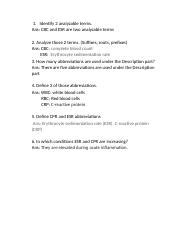
The CBC blood panel test has numerous practical applications in medicine, ranging from routine check-ups to emergency situations. The test is often used as a screening tool to detect potential health issues, such as anemia, infection, and inflammation. The test is also used to monitor chronic conditions, such as diabetes and cardiovascular disease, and to detect acute infections, such as pneumonia and sepsis.
The CBC blood panel test is also used in various medical specialties, such as hematology, oncology, and infectious diseases. The test is used to diagnose and monitor blood disorders, such as sickle cell disease and leukemia, and to detect infections, such as HIV and tuberculosis. The test is also used in emergency medicine to quickly diagnose and treat life-threatening conditions, such as bleeding disorders and sepsis.
Benefits of CBC Blood Panel Test

The CBC blood panel test has numerous benefits, including:
- Early detection of potential health issues
- Monitoring of chronic conditions
- Detection of acute infections
- Diagnosis of blood disorders
- Quick and accurate results
- Non-invasive and relatively painless procedure
The test is also relatively inexpensive and widely available, making it a valuable tool for healthcare professionals. The test's ability to provide a comprehensive overview of a patient's blood profile makes it an essential component of modern medicine.
Steps Involved in CBC Blood Panel Test
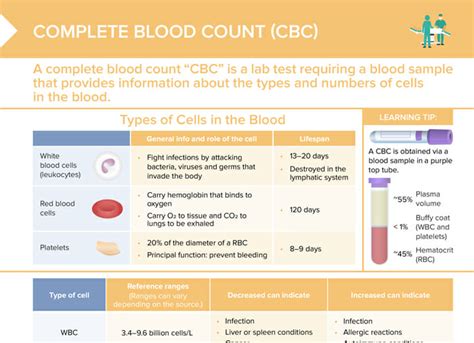
The steps involved in the CBC blood panel test include:
- Drawing a blood sample from a vein in the arm
- Sending the blood sample to a laboratory for analysis
- Analyzing the blood sample using an automated analyzer
- Reporting the results in a standardized format
- Interpreting the results by healthcare professionals
The test is typically performed by a healthcare professional, such as a nurse or a doctor, who draws the blood sample and sends it to a laboratory for analysis. The results are then reported to the healthcare professional, who interprets the results and makes a diagnosis or recommends further testing.
Preparation for CBC Blood Panel Test
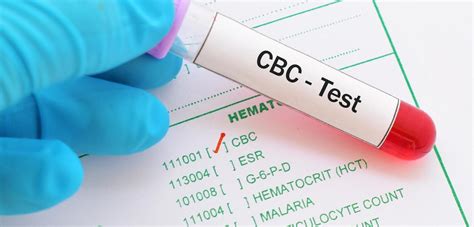
Preparation for the CBC blood panel test is relatively simple and involves:
- Fasting for 8-12 hours before the test
- Avoiding certain medications, such as anticoagulants and antiplatelet agents
- Informing the healthcare professional about any medical conditions or allergies
- Wearing loose and comfortable clothing
It is essential to follow the healthcare professional's instructions and to ask any questions or concerns before the test. The test is relatively quick and painless, and the results are usually available within a few hours.
Risks and Limitations of CBC Blood Panel Test
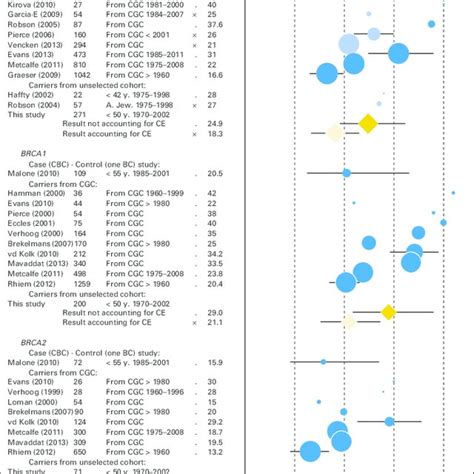
The CBC blood panel test is a relatively safe and non-invasive procedure, but it does have some risks and limitations, including:
- Bleeding or bruising at the needle site
- Infection at the needle site
- Allergic reactions to the antiseptic or other materials used during the test
- False or inaccurate results due to laboratory errors or equipment malfunction
It is essential to discuss any concerns or questions with the healthcare professional before the test. The test's limitations include its inability to detect certain medical conditions, such as some types of anemia or infection.
What is a CBC blood panel test?
+A CBC blood panel test is a laboratory test that measures various components of the blood, including red blood cells, white blood cells, platelets, and hemoglobin.
What are the benefits of a CBC blood panel test?
+The benefits of a CBC blood panel test include early detection of potential health issues, monitoring of chronic conditions, detection of acute infections, and diagnosis of blood disorders.
What are the risks and limitations of a CBC blood panel test?
+The risks and limitations of a CBC blood panel test include bleeding or bruising at the needle site, infection at the needle site, allergic reactions, and false or inaccurate results due to laboratory errors or equipment malfunction.
We hope this article has provided you with a comprehensive overview of the CBC blood panel test, its components, working mechanisms, and practical applications. If you have any questions or concerns, please do not hesitate to comment below or share this article with others. Remember to consult with a healthcare professional if you have any concerns about your health or if you need further testing or diagnosis.
